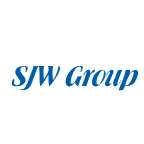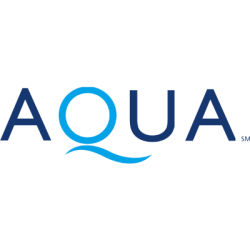SJW

SJW Group
SJW
(3.2)47,60 USD
2.34% ROA
7.08% ROE
21.04x PER
1.859.981.519,00 USD
139.35% DER
2.78% Yield
12.47% NPM
SJW Group Stock Analysis
SJW Group Fundamental Analysis
Fundamental analysis in stock investing is like studying the foundation of a house before buying it. It involves looking at a company's financial health, like its earnings, assets, and debts, to determine if it's a good investment based on its fundamental strength and potential for growth.
| # | Analysis | Rating |
|---|---|---|
| 1 |
Revenue Growth
With continuous growth in revenue over the last five years, this company has proven to be a lucrative investment option, showcasing its strong financial performance. |
|
| 2 |
Assets Growth
This company's revenue has experienced steady growth over the last five years, indicating a reliable and prosperous financial trajectory. |
|
| 3 |
Dividend Growth
Investors can take confidence in the company's impressive track record of annual dividend growth over the last five years, showcasing a commitment to rewarding shareholders. |
|
| 4 |
Dividend
Investors can trust the company's impressive dividend track record, consistently distributing dividends over the past five years, showcasing a strong commitment to rewarding shareholders. |
|
| 5 |
ROE
The stock's ROE falls within an average range (8.56%), demonstrating satisfactory profitability and efficiency in utilizing shareholders' equity. |
|
| 6 |
ROA
The stock's ROA (3.15%) shows that it's doing a pretty good job at making money from its assets, making it a solid choice to invest and earn steady profits. |
|
| 7 |
PBV
The stock's PBV ratio (1.71x) reflects a fair valuation, making it an attractive option for investors seeking balanced opportunities. |
|
| 8 |
Net Profit Growth
Over the last three years, this company has consistently achieved net profit growth, indicating a favorable financial performance and making it an attractive investment option. |
|
| 9 |
Buffet Intrinsic Value
The company's stock shows potential as it is undervalued (728) according to Warren Buffett's formula, indicating that its intrinsic value exceeds the market price. |
|
| 10 |
DER
The company has a high debt to equity ratio (140%), which means it owes a lot of money compared to what it actually owns, making it financially risky. |
|
| 11 |
Graham Number
The company's Graham number indicates that it is overvalued compared to its stock price, suggesting a potentially unfavorable investment opportunity. |
SJW Group Technical Analysis
Technical analysis in stock investing is like reading the patterns on a weather map to predict future weather conditions. It involves studying past stock price movements and trading volumes to make predictions about where a stock's price might go next, without necessarily looking at the company's financial health.
| # | Analysis | Recommendation |
|---|---|---|
| 1 | Awesome Oscillator | Buy |
| 2 | MACD | Buy |
| 3 | RSI | Hold |
| 4 | Stoch RSI | Sell |
SJW Group Price Chart
Financial Statements
Financial statements are like report cards for companies. They show how much money a company makes (income statement), what it owns and owes (balance sheet), and where it spends its money (cash flow statement), helping stock investors understand if a company is healthy and worth investing in.
Income Statements
An income statement for a company is like a scoreboard for its profits and losses. It shows how much money the company made (revenue) and how much it spent to make that money (expenses), helping stock investors see if a company is making a profit or not.
Revenue in stock investing is the total amount of money a company earns from its sales, and it's a key factor that investors consider to assess a company's financial performance and growth potential.
| Year | Revenue | Growth |
|---|---|---|
| 1985 | 61.000.000 | |
| 1986 | 64.600.000 | 5.57% |
| 1987 | 65.700.000 | 1.67% |
| 1988 | 62.600.000 | -4.95% |
| 1989 | 56.000.000 | -11.79% |
| 1990 | 70.500.000 | 20.57% |
| 1991 | 76.300.000 | 7.6% |
| 1992 | 89.100.000 | 14.37% |
| 1993 | 95.000.000 | 6.21% |
| 1994 | 99.400.000 | 4.43% |
| 1995 | 97.400.000 | -2.05% |
| 1996 | 102.600.000 | 5.07% |
| 1997 | 110.100.000 | 6.81% |
| 1998 | 106.010.000 | -3.86% |
| 1999 | 117.001.000 | 9.39% |
| 2000 | 123.157.000 | 5% |
| 2001 | 136.083.000 | 9.5% |
| 2002 | 145.652.000 | 6.57% |
| 2003 | 149.732.000 | 2.72% |
| 2004 | 166.911.000 | 10.29% |
| 2005 | 180.105.000 | 7.33% |
| 2006 | 189.238.000 | 4.83% |
| 2007 | 206.601.000 | 8.4% |
| 2008 | 220.347.000 | 6.24% |
| 2009 | 216.097.000 | -1.97% |
| 2010 | 215.638.000 | -0.21% |
| 2011 | 238.955.000 | 9.76% |
| 2012 | 261.547.000 | 8.64% |
| 2013 | 276.869.000 | 5.53% |
| 2014 | 319.668.000 | 13.39% |
| 2015 | 305.082.000 | -4.78% |
| 2016 | 339.706.000 | 10.19% |
| 2017 | 389.225.000 | 12.72% |
| 2018 | 397.699.000 | 2.13% |
| 2019 | 420.482.000 | 5.42% |
| 2020 | 564.526.000 | 25.52% |
| 2021 | 573.686.000 | 1.6% |
| 2022 | 620.698.000 | 7.57% |
| 2023 | 819.372.000 | 24.25% |
| 2023 | 670.363.000 | -22.23% |
| 2024 | 704.696.000 | 4.87% |
Research and Development Expenses are the costs a company incurs to create and improve its products or services, which can be important for investors to evaluate a company's innovation and potential for future growth.
| Year | Research and Development Expenses | Growth |
|---|---|---|
| 1985 | 0 | |
| 1986 | 0 | 0% |
| 1987 | 0 | 0% |
| 1988 | 0 | 0% |
| 1989 | 0 | 0% |
| 1990 | 0 | 0% |
| 1991 | 0 | 0% |
| 1992 | 0 | 0% |
| 1993 | 0 | 0% |
| 1994 | 0 | 0% |
| 1995 | 0 | 0% |
| 1996 | 0 | 0% |
| 1997 | 0 | 0% |
| 1998 | 0 | 0% |
| 1999 | 0 | 0% |
| 2000 | 0 | 0% |
| 2001 | 0 | 0% |
| 2002 | 0 | 0% |
| 2003 | 0 | 0% |
| 2004 | 0 | 0% |
| 2005 | 0 | 0% |
| 2006 | 0 | 0% |
| 2007 | 0 | 0% |
| 2008 | 0 | 0% |
| 2009 | 0 | 0% |
| 2010 | 0 | 0% |
| 2011 | 0 | 0% |
| 2012 | 0 | 0% |
| 2013 | 0 | 0% |
| 2014 | 0 | 0% |
| 2015 | 0 | 0% |
| 2016 | 0 | 0% |
| 2017 | 0 | 0% |
| 2018 | 0 | 0% |
| 2019 | 0 | 0% |
| 2020 | 0 | 0% |
| 2021 | 0 | 0% |
| 2022 | 0 | 0% |
| 2023 | 0 | 0% |
| 2023 | 0 | 0% |
| 2024 | 0 | 0% |
General and Administrative Expenses are the costs a company incurs to run its day-to-day operations, such as office rent, salaries, and utilities, which investors consider to understand a company's overall efficiency and management effectiveness.
| Year | General and Administrative Expenses | Growth |
|---|---|---|
| 1985 | 0 | |
| 1986 | 0 | 0% |
| 1987 | 0 | 0% |
| 1988 | 0 | 0% |
| 1989 | 0 | 0% |
| 1990 | 0 | 0% |
| 1991 | 0 | 0% |
| 1992 | 0 | 0% |
| 1993 | 0 | 0% |
| 1994 | 0 | 0% |
| 1995 | 0 | 0% |
| 1996 | 0 | 0% |
| 1997 | 0 | 0% |
| 1998 | 0 | 0% |
| 1999 | 0 | 0% |
| 2000 | 0 | 0% |
| 2001 | 0 | 0% |
| 2002 | 0 | 0% |
| 2003 | 0 | 0% |
| 2004 | 17.285.000 | 100% |
| 2005 | 20.697.000 | 16.49% |
| 2006 | 21.108.000 | 1.95% |
| 2007 | 22.334.000 | 5.49% |
| 2008 | 23.688.000 | 5.72% |
| 2009 | 27.658.000 | 14.35% |
| 2010 | 30.134.000 | 8.22% |
| 2011 | 39.136.000 | 23% |
| 2012 | 42.812.000 | 8.59% |
| 2013 | 43.714.000 | 2.06% |
| 2014 | 40.573.000 | -7.74% |
| 2015 | 47.131.000 | 13.91% |
| 2016 | 48.038.000 | 1.89% |
| 2017 | 55.011.000 | 12.68% |
| 2018 | 48.933.000 | -12.42% |
| 2019 | 66.301.000 | 26.2% |
| 2020 | 79.741.000 | 16.85% |
| 2021 | 87.332.000 | 8.69% |
| 2022 | 95.404.000 | 8.46% |
| 2023 | 95.552.000 | 0.15% |
| 2023 | 98.656.000 | 3.15% |
| 2024 | 78.116.000 | -26.29% |
EBITDA stands for Earnings Before Interest, Taxes, Depreciation, and Amortization. It is a measure that helps stock investors analyze a company's profitability by looking at its earnings without considering certain expenses. This helps to get a clearer picture of the company's financial performance and its ability to generate cash flow.
| Year | EBITDA | Growth |
|---|---|---|
| 1985 | 61.000.000 | |
| 1986 | 64.600.000 | 5.57% |
| 1987 | 65.700.000 | 1.67% |
| 1988 | 62.600.000 | -4.95% |
| 1989 | 56.000.000 | -11.79% |
| 1990 | 70.500.000 | 20.57% |
| 1991 | 76.300.000 | 7.6% |
| 1992 | 89.100.000 | 14.37% |
| 1993 | 95.000.000 | 6.21% |
| 1994 | 26.300.000 | -261.22% |
| 1995 | 29.600.000 | 11.15% |
| 1996 | 28.500.000 | -3.86% |
| 1997 | 36.800.000 | 22.55% |
| 1998 | 115.594.000 | 68.16% |
| 1999 | 40.324.000 | -186.66% |
| 2000 | 35.567.000 | -13.37% |
| 2001 | 40.458.000 | 12.09% |
| 2002 | 44.413.000 | 8.91% |
| 2003 | 51.973.000 | 14.55% |
| 2004 | 58.018.000 | 10.42% |
| 2005 | 66.375.000 | 12.59% |
| 2006 | 68.150.000 | 2.6% |
| 2007 | 62.577.000 | -8.91% |
| 2008 | 66.841.000 | 6.38% |
| 2009 | 55.043.000 | -21.43% |
| 2010 | 79.384.000 | 30.66% |
| 2011 | 86.312.000 | 8.03% |
| 2012 | 92.674.000 | 6.86% |
| 2013 | 90.002.000 | -2.97% |
| 2014 | 132.369.000 | 32.01% |
| 2015 | 122.290.000 | -8.24% |
| 2016 | 139.411.000 | 12.28% |
| 2017 | 148.580.000 | 6.17% |
| 2018 | 146.601.000 | -1.35% |
| 2019 | 132.338.000 | -10.78% |
| 2020 | 208.918.000 | 36.66% |
| 2021 | 309.492.000 | 32.5% |
| 2022 | 236.243.000 | -31.01% |
| 2023 | 335.928.000 | 29.67% |
| 2023 | 265.225.000 | -26.66% |
| 2024 | 275.744.000 | 3.81% |
Gross profit is the money a company makes from selling its products or services after subtracting the cost of producing or providing them, and it is an important measure for investors to understand a company's profitability.
| Year | Gross Profit | Growth |
|---|---|---|
| 1985 | 61.000.000 | |
| 1986 | 64.600.000 | 5.57% |
| 1987 | 65.700.000 | 1.67% |
| 1988 | 62.600.000 | -4.95% |
| 1989 | 56.000.000 | -11.79% |
| 1990 | 70.500.000 | 20.57% |
| 1991 | 76.300.000 | 7.6% |
| 1992 | 89.100.000 | 14.37% |
| 1993 | 95.000.000 | 6.21% |
| 1994 | 75.700.000 | -25.5% |
| 1995 | 73.200.000 | -3.42% |
| 1996 | 76.600.000 | 4.44% |
| 1997 | 81.800.000 | 6.36% |
| 1998 | 78.627.000 | -4.04% |
| 1999 | 85.258.000 | 7.78% |
| 2000 | 89.327.000 | 4.56% |
| 2001 | 94.769.000 | 5.74% |
| 2002 | 100.619.000 | 5.81% |
| 2003 | 107.728.000 | 6.6% |
| 2004 | 120.180.000 | 10.36% |
| 2005 | 130.834.000 | 8.14% |
| 2006 | 139.172.000 | 5.99% |
| 2007 | 150.473.000 | 7.51% |
| 2008 | 164.497.000 | 8.53% |
| 2009 | 132.563.000 | -24.09% |
| 2010 | 139.038.000 | 4.66% |
| 2011 | 146.902.000 | 5.35% |
| 2012 | 140.910.000 | -4.25% |
| 2013 | 142.477.000 | 1.1% |
| 2014 | 182.442.000 | 21.91% |
| 2015 | 179.498.000 | -1.64% |
| 2016 | 197.902.000 | 9.3% |
| 2017 | 215.024.000 | 7.96% |
| 2018 | 210.559.000 | -2.12% |
| 2019 | 224.208.000 | 6.09% |
| 2020 | 316.576.000 | 29.18% |
| 2021 | 318.572.000 | 0.63% |
| 2022 | 357.174.000 | 10.81% |
| 2023 | 462.976.000 | 22.85% |
| 2023 | 388.434.000 | -19.19% |
| 2024 | 309.352.000 | -25.56% |
Net income in stock investing is like the money a company actually gets to keep as profit after paying all its bills, and it's an important measure to understand how well a company is doing financially.
| Year | Net Profit | Growth |
|---|---|---|
| 1985 | 8.600.000 | |
| 1986 | 9.400.000 | 8.51% |
| 1987 | 8.900.000 | -5.62% |
| 1988 | 7.200.000 | -23.61% |
| 1989 | 4.300.000 | -67.44% |
| 1990 | 8.500.000 | 49.41% |
| 1991 | 8.400.000 | -1.19% |
| 1992 | 10.200.000 | 17.65% |
| 1993 | 11.800.000 | 13.56% |
| 1994 | 9.900.000 | -19.19% |
| 1995 | 11.500.000 | 13.91% |
| 1996 | 18.600.000 | 38.17% |
| 1997 | 20.700.000 | 10.14% |
| 1998 | 16.018.000 | -29.23% |
| 1999 | 15.884.000 | -0.84% |
| 2000 | 10.665.000 | -48.94% |
| 2001 | 12.863.000 | 17.09% |
| 2002 | 14.232.000 | 9.62% |
| 2003 | 18.677.000 | 23.8% |
| 2004 | 19.786.000 | 5.6% |
| 2005 | 21.840.000 | 9.4% |
| 2006 | 38.581.000 | 43.39% |
| 2007 | 19.323.000 | -99.66% |
| 2008 | 21.461.000 | 9.96% |
| 2009 | 15.171.000 | -41.46% |
| 2010 | 24.406.000 | 37.84% |
| 2011 | 20.878.000 | -16.9% |
| 2012 | 22.318.000 | 6.45% |
| 2013 | 22.384.000 | 0.29% |
| 2014 | 51.806.000 | 56.79% |
| 2015 | 37.882.000 | -36.76% |
| 2016 | 52.839.000 | 28.31% |
| 2017 | 59.204.000 | 10.75% |
| 2018 | 38.767.000 | -52.72% |
| 2019 | 23.403.000 | -65.65% |
| 2020 | 61.515.000 | 61.96% |
| 2021 | 60.478.000 | -1.71% |
| 2022 | 73.828.000 | 18.08% |
| 2023 | 146.160.000 | 49.49% |
| 2023 | 84.987.000 | -71.98% |
| 2024 | 82.784.000 | -2.66% |
EPS, or earnings per share, is a measure that shows how much profit a company has earned for each outstanding share of its stock, and it is important for stock investors as it helps understand the profitability of a company and compare it with other companies in the market.
| Year | Earning per Share (EPS) | Growth |
|---|---|---|
| 1985 | 0 | |
| 1986 | 0 | 0% |
| 1987 | 0 | 0% |
| 1988 | 0 | 0% |
| 1989 | 0 | 0% |
| 1990 | 0 | 0% |
| 1991 | 0 | 0% |
| 1992 | 0 | 0% |
| 1993 | 0 | 0% |
| 1994 | 1 | 0% |
| 1995 | 1 | 0% |
| 1996 | 0 | 0% |
| 1997 | 0 | 0% |
| 1998 | 1 | 0% |
| 1999 | 1 | 0% |
| 2000 | 1 | 0% |
| 2001 | 1 | 0% |
| 2002 | 0 | 0% |
| 2003 | 0 | 0% |
| 2004 | 1 | 0% |
| 2005 | 1 | 0% |
| 2006 | 2 | 100% |
| 2007 | 1 | -100% |
| 2008 | 1 | 0% |
| 2009 | 1 | 0% |
| 2010 | 1 | 100% |
| 2011 | 1 | 0% |
| 2012 | 1 | 0% |
| 2013 | 1 | 0% |
| 2014 | 3 | 50% |
| 2015 | 2 | -100% |
| 2016 | 3 | 50% |
| 2017 | 3 | 0% |
| 2018 | 2 | -100% |
| 2019 | 1 | 0% |
| 2020 | 2 | 100% |
| 2021 | 2 | 0% |
| 2022 | 2 | 0% |
| 2023 | 5 | 50% |
| 2023 | 3 | -100% |
| 2024 | 3 | 0% |
Cashflow Statements
Cashflow statements show the movement of money in and out of a company, helping stock investors understand how much money a company makes and spends. By examining cashflow statements, investors can assess if a company is generating enough cash to pay its bills, invest in growth, and provide returns to stockholders.
Free cash flow is the leftover cash that a company generates after covering its operating expenses and capital expenditures, which is important for stock investors as it shows how much money a company has available to invest in growth, pay dividends, or reduce debt.
| Year | Free Cashflow | Growth |
|---|---|---|
| 1994 | 1.100.000 | |
| 1995 | 3.200.000 | 65.63% |
| 1996 | -1.800.000 | 277.78% |
| 1997 | -300.000 | -500% |
| 1998 | -11.782.000 | 97.45% |
| 1999 | -8.782.000 | -34.16% |
| 2000 | -9.731.000 | 9.75% |
| 2001 | -22.548.000 | 56.84% |
| 2002 | -8.505.000 | -165.11% |
| 2003 | -20.355.000 | 58.22% |
| 2004 | -1.032.000 | -1872.38% |
| 2005 | -9.148.000 | 88.72% |
| 2006 | -27.235.000 | 66.41% |
| 2007 | -32.346.000 | 15.8% |
| 2008 | -19.745.000 | -63.82% |
| 2009 | -9.699.000 | -103.58% |
| 2010 | -71.534.000 | 86.44% |
| 2011 | -7.362.000 | -871.67% |
| 2012 | -32.389.000 | 77.27% |
| 2013 | -33.595.000 | 3.59% |
| 2014 | -37.576.000 | 10.59% |
| 2015 | -13.190.000 | -184.88% |
| 2016 | -31.509.000 | 58.14% |
| 2017 | -51.299.000 | 38.58% |
| 2018 | -56.993.000 | 9.99% |
| 2019 | -52.909.000 | -7.72% |
| 2020 | -110.924.000 | 52.3% |
| 2021 | -123.770.000 | 10.38% |
| 2022 | -78.040.000 | -58.6% |
| 2023 | 2.710.000 | 2979.7% |
| 2023 | -99.893.000 | 102.71% |
| 2024 | -48.010.000 | -108.07% |
Operating cash flow represents the cash generated or consumed by a company's day-to-day operations, excluding external investing or financing activities, and is crucial for stock investors as it shows how much cash a company is generating from its core business operations.
| Year | Operating Cashflow | Growth |
|---|---|---|
| 1994 | 18.500.000 | |
| 1995 | 22.200.000 | 16.67% |
| 1996 | 19.300.000 | -15.03% |
| 1997 | 23.900.000 | 19.25% |
| 1998 | 26.934.000 | 11.26% |
| 1999 | 23.580.000 | -14.22% |
| 2000 | 24.034.000 | 1.89% |
| 2001 | 25.454.000 | 5.58% |
| 2002 | 29.091.000 | 12.5% |
| 2003 | 41.987.000 | 30.71% |
| 2004 | 41.231.000 | -1.83% |
| 2005 | 42.621.000 | 3.26% |
| 2006 | 44.524.000 | 4.27% |
| 2007 | 42.031.000 | -5.93% |
| 2008 | 51.792.000 | 18.85% |
| 2009 | 54.456.000 | 4.89% |
| 2010 | 37.167.000 | -46.52% |
| 2011 | 64.204.000 | 42.11% |
| 2012 | 74.367.000 | 13.67% |
| 2013 | 63.425.000 | -17.25% |
| 2014 | 65.911.000 | 3.77% |
| 2015 | 97.257.000 | 32.23% |
| 2016 | 114.072.000 | 14.74% |
| 2017 | 101.112.000 | -12.82% |
| 2018 | 91.343.000 | -10.69% |
| 2019 | 130.005.000 | 29.74% |
| 2020 | 104.051.000 | -24.94% |
| 2021 | 130.040.000 | 19.99% |
| 2022 | 166.199.000 | 21.76% |
| 2023 | 2.710.000 | -6032.8% |
| 2023 | 190.831.000 | 98.58% |
| 2024 | 49.316.000 | -286.96% |
Capex, short for capital expenditures, refers to the money a company spends on acquiring or upgrading tangible assets like buildings, equipment, or technology, which is important for stock investors as it indicates how much a company is investing in its infrastructure to support future growth and profitability.
| Year | Capital Expenditure | Growth |
|---|---|---|
| 1994 | 17.400.000 | |
| 1995 | 19.000.000 | 8.42% |
| 1996 | 21.100.000 | 9.95% |
| 1997 | 24.200.000 | 12.81% |
| 1998 | 38.716.000 | 37.49% |
| 1999 | 32.362.000 | -19.63% |
| 2000 | 33.765.000 | 4.16% |
| 2001 | 48.002.000 | 29.66% |
| 2002 | 37.596.000 | -27.68% |
| 2003 | 62.342.000 | 39.69% |
| 2004 | 42.263.000 | -47.51% |
| 2005 | 51.769.000 | 18.36% |
| 2006 | 71.759.000 | 27.86% |
| 2007 | 74.377.000 | 3.52% |
| 2008 | 71.537.000 | -3.97% |
| 2009 | 64.155.000 | -11.51% |
| 2010 | 108.701.000 | 40.98% |
| 2011 | 71.566.000 | -51.89% |
| 2012 | 106.756.000 | 32.96% |
| 2013 | 97.020.000 | -10.04% |
| 2014 | 103.487.000 | 6.25% |
| 2015 | 110.447.000 | 6.3% |
| 2016 | 145.581.000 | 24.13% |
| 2017 | 152.411.000 | 4.48% |
| 2018 | 148.336.000 | -2.75% |
| 2019 | 182.914.000 | 18.9% |
| 2020 | 214.975.000 | 14.91% |
| 2021 | 253.810.000 | 15.3% |
| 2022 | 244.239.000 | -3.92% |
| 2023 | 0 | 0% |
| 2023 | 290.724.000 | 100% |
| 2024 | 97.326.000 | -198.71% |
Balance Sheet
Balance sheets provide a snapshot of a company's financial health and its assets (such as cash, inventory, and property) and liabilities (like debts and obligations) at a specific point in time. For stock investors, balance sheets help assess the company's overall worth and evaluate its ability to meet financial obligations and support future growth.
Equity refers to the ownership interest or stake that shareholders have in a company, representing their claim on its assets and earnings after all debts and liabilities are paid.
| Year | Equity | Growth |
|---|---|---|
| 1994 | 104.000.000 | |
| 1995 | 108.900.000 | 4.5% |
| 1996 | 120.000.000 | 9.25% |
| 1997 | 133.600.000 | 10.18% |
| 1998 | 143.149.000 | 6.67% |
| 1999 | 143.894.000 | 0.52% |
| 2000 | 144.325.000 | 0.3% |
| 2001 | 149.354.000 | 3.37% |
| 2002 | 153.499.000 | 2.7% |
| 2003 | 166.368.000 | 7.74% |
| 2004 | 184.691.000 | 9.92% |
| 2005 | 195.908.000 | 5.73% |
| 2006 | 228.182.000 | 14.14% |
| 2007 | 236.934.000 | 3.69% |
| 2008 | 254.326.000 | 6.84% |
| 2009 | 252.756.000 | -0.62% |
| 2010 | 255.032.000 | 0.89% |
| 2011 | 264.004.000 | 3.4% |
| 2012 | 274.604.000 | 3.86% |
| 2013 | 321.175.000 | 14.5% |
| 2014 | 360.155.000 | 10.82% |
| 2015 | 383.783.000 | 6.16% |
| 2016 | 421.646.000 | 8.98% |
| 2017 | 463.209.000 | 8.97% |
| 2018 | 889.312.000 | 47.91% |
| 2019 | 889.984.000 | 0.08% |
| 2020 | 917.160.000 | 2.96% |
| 2021 | 1.034.519.000 | 11.34% |
| 2022 | 1.110.868.000 | 6.87% |
| 2023 | 1.220.253.000 | 8.96% |
| 2023 | 1.233.397.000 | 1.07% |
| 2024 | 1.274.608.000 | 3.23% |
Assets represent the valuable resources that a company owns, such as cash, inventory, property, and equipment, and understanding a company's assets helps investors assess its value and potential for generating future profits.
| Year | Assets | Growth |
|---|---|---|
| 1994 | 262.500.000 | |
| 1995 | 280.500.000 | 6.42% |
| 1996 | 296.500.000 | 5.4% |
| 1997 | 323.200.000 | 8.26% |
| 1998 | 359.380.000 | 10.07% |
| 1999 | 372.427.000 | 3.5% |
| 2000 | 391.930.000 | 4.98% |
| 2001 | 431.017.000 | 9.07% |
| 2002 | 453.223.000 | 4.9% |
| 2003 | 511.717.000 | 11.43% |
| 2004 | 552.152.000 | 7.32% |
| 2005 | 587.709.000 | 6.05% |
| 2006 | 705.864.000 | 16.74% |
| 2007 | 767.326.000 | 8.01% |
| 2008 | 850.877.000 | 9.82% |
| 2009 | 878.474.000 | 3.14% |
| 2010 | 935.362.000 | 6.08% |
| 2011 | 1.038.810.000 | 9.96% |
| 2012 | 1.087.499.000 | 4.48% |
| 2013 | 1.109.986.000 | 2.03% |
| 2014 | 1.269.304.000 | 12.55% |
| 2015 | 1.340.963.000 | 5.34% |
| 2016 | 1.443.376.000 | 7.1% |
| 2017 | 1.458.001.000 | 1% |
| 2018 | 1.956.389.000 | 25.47% |
| 2019 | 3.132.470.000 | 37.54% |
| 2020 | 3.319.132.000 | 5.62% |
| 2021 | 3.485.973.000 | 4.79% |
| 2022 | 3.632.624.000 | 4.04% |
| 2023 | 3.843.428.000 | 5.48% |
| 2023 | 4.426.288.000 | 13.17% |
| 2024 | 4.439.427.000 | 0.3% |
Liabilities refer to the financial obligations or debts that a company owes to creditors or external parties, and understanding a company's liabilities is important for investors as it helps assess the company's financial risk and ability to meet its obligations.
| Year | Liabilities | Growth |
|---|---|---|
| 1994 | 158.500.000 | |
| 1995 | 171.600.000 | 7.63% |
| 1996 | 176.500.000 | 2.78% |
| 1997 | 189.600.000 | 6.91% |
| 1998 | 216.231.000 | 12.32% |
| 1999 | 228.533.000 | 5.38% |
| 2000 | 247.605.000 | 7.7% |
| 2001 | 281.663.000 | 12.09% |
| 2002 | 299.724.000 | 6.03% |
| 2003 | 345.349.000 | 13.21% |
| 2004 | 367.461.000 | 6.02% |
| 2005 | 391.801.000 | 6.21% |
| 2006 | 477.682.000 | 17.98% |
| 2007 | 530.392.000 | 9.94% |
| 2008 | 596.551.000 | 11.09% |
| 2009 | 625.718.000 | 4.66% |
| 2010 | 680.330.000 | 8.03% |
| 2011 | 774.806.000 | 12.19% |
| 2012 | 812.895.000 | 4.69% |
| 2013 | 788.811.000 | -3.05% |
| 2014 | 909.149.000 | 13.24% |
| 2015 | 957.180.000 | 5.02% |
| 2016 | 1.021.730.000 | 6.32% |
| 2017 | 994.792.000 | -2.71% |
| 2018 | 1.067.077.000 | 6.77% |
| 2019 | 2.242.486.000 | 52.42% |
| 2020 | 2.401.972.000 | 6.64% |
| 2021 | 2.451.454.000 | 2.02% |
| 2022 | 2.521.756.000 | 2.79% |
| 2023 | 2.623.175.000 | 3.87% |
| 2023 | 3.192.891.000 | 17.84% |
| 2024 | 3.164.819.000 | -0.89% |
SJW Group Financial Ratio (TTM)
Valuation Metrics
- Revenue per Share
- 21.66
- Net Income per Share
- 2.7
- Price to Earning Ratio
- 21.04x
- Price To Sales Ratio
- 2.65x
- POCF Ratio
- 9.5
- PFCF Ratio
- -13.02
- Price to Book Ratio
- 1.45
- EV to Sales
- 5.15
- EV Over EBITDA
- 13.19
- EV to Operating CashFlow
- 18.63
- EV to FreeCashFlow
- -25.3
- Earnings Yield
- 0.05
- FreeCashFlow Yield
- -0.08
- Market Cap
- 1,86 Bil.
- Enterprise Value
- 3,61 Bil.
- Graham Number
- 48.91
- Graham NetNet
- -93.89
Income Statement Metrics
- Net Income per Share
- 2.7
- Income Quality
- 2.22
- ROE
- 0.07
- Return On Assets
- 0.02
- Return On Capital Employed
- 0.04
- Net Income per EBT
- 0.9
- EBT Per Ebit
- 0.61
- Ebit per Revenue
- 0.23
- Effective Tax Rate
- 0.1
Margins
- Sales, General, & Administrative to Revenue
- 0.14
- Research & Developement to Revenue
- 0
- Stock Based Compensation to Revenue
- 0.01
- Gross Profit Margin
- 0.48
- Operating Profit Margin
- 0.23
- Pretax Profit Margin
- 0.14
- Net Profit Margin
- 0.12
Dividends
- Dividend Yield
- 0.03
- Dividend Yield %
- 2.78
- Payout Ratio
- 0.57
- Dividend Per Share
- 1.58
Operating Metrics
- Operating Cashflow per Share
- 5.99
- Free CashFlow per Share
- -4.41
- Capex to Operating CashFlow
- 1.74
- Capex to Revenue
- 0.48
- Capex to Depreciation
- 3.01
- Return on Invested Capital
- 0.05
- Return on Tangible Assets
- 0.02
- Days Sales Outstanding
- 69.51
- Days Payables Outstanding
- 38.36
- Days of Inventory on Hand
- 0
- Receivables Turnover
- 5.25
- Payables Turnover
- 9.51
- Inventory Turnover
- 360900000
- Capex per Share
- 10.4
Balance Sheet
- Cash per Share
- 0,70
- Book Value per Share
- 39,34
- Tangible Book Value per Share
- 17.59
- Shareholders Equity per Share
- 39.34
- Interest Debt per Share
- 56.98
- Debt to Equity
- 1.39
- Debt to Assets
- 0.4
- Net Debt to EBITDA
- 6.4
- Current Ratio
- 0.49
- Tangible Asset Value
- 0,57 Bil.
- Net Current Asset Value
- -2,99 Bil.
- Invested Capital
- 3811158000
- Working Capital
- -0,18 Bil.
- Intangibles to Total Assets
- 0.16
- Average Receivables
- 0,12 Bil.
- Average Payables
- 0,04 Bil.
- Average Inventory
- 1
- Debt to Market Cap
- 0.95
Dividends
Dividends in stock investing are like rewards that companies give to their shareholders. They are a portion of the company's profits distributed to investors, typically in the form of cash payments, as a way for them to share in the company's success.
| Year | Dividends | Growth |
|---|---|---|
| 1980 | 2 | |
| 1981 | 2 | 0% |
| 1982 | 2 | 50% |
| 1983 | 2 | 0% |
| 1984 | 3 | 0% |
| 1985 | 1 | 0% |
| 1986 | 2 | 100% |
| 1987 | 2 | 0% |
| 1988 | 2 | 0% |
| 1989 | 2 | 0% |
| 1990 | 2 | 0% |
| 1991 | 2 | 0% |
| 1992 | 2 | 50% |
| 1993 | 2 | 0% |
| 1994 | 2 | 0% |
| 1995 | 2 | 0% |
| 1996 | 2 | 0% |
| 1997 | 2 | 0% |
| 1998 | 2 | 0% |
| 1999 | 2 | 0% |
| 2000 | 2 | 0% |
| 2001 | 3 | 0% |
| 2002 | 3 | 0% |
| 2003 | 3 | 0% |
| 2004 | 2 | -100% |
| 2005 | 1 | 0% |
| 2006 | 1 | 0% |
| 2007 | 1 | 0% |
| 2008 | 1 | 0% |
| 2009 | 1 | 0% |
| 2010 | 1 | 0% |
| 2011 | 1 | 0% |
| 2012 | 1 | 0% |
| 2013 | 1 | 0% |
| 2014 | 1 | 0% |
| 2015 | 1 | 0% |
| 2016 | 1 | 0% |
| 2017 | 1 | 100% |
| 2018 | 1 | 0% |
| 2019 | 1 | 0% |
| 2020 | 1 | 0% |
| 2021 | 1 | 0% |
| 2022 | 1 | 0% |
| 2023 | 2 | 0% |
| 2024 | 1 | 0% |
SJW Group Profile
About SJW Group
SJW Group, through its subsidiaries, provides water utility services in the United States. It engages in the production, purchase, storage, purification, distribution, wholesale, and retail sale of water and wastewater services. The company also provides non-tariffed services, including water system operations, maintenance agreements, and antenna site leases; contracted services and sewer operations to water utilities; and a Linebacker protection plan for public drinking water customers in Connecticut and Maine. Its water supply consists of groundwater from wells, surface water from watershed run-off and diversion, reclaimed water, and imported water purchased from the Santa Clara Valley Water District. The company offers water service to approximately 231,000 connections that serve approximately one million people residing in portions of the cities of San Jose and Cupertino, as well as in the cities of Campbell, Monte Sereno, Saratoga, and the Town of Los Gatos; and adjacent unincorporated territories in the County of Santa Clara in the State of California. In addition, it provides water service to approximately 140,000 connections, which serve approximately 456,000 people in 81 municipalities with a service area comprising approximately 269 square miles throughout Connecticut and Maine, as well as approximately 24,000 connections that serve approximately 70,000 people in a service area comprising approximately 266 square miles in the region between San Antonio and Austin, Texas; and approximately 3,000 wastewater connections in Southbury, Connecticut. Further, the company owns undeveloped land in California and Tennessee; and owns and operates commercial buildings and warehouse properties in Tennessee. The company was formerly known as SJW Corp. and changed its name to SJW Group in November 2016. SJW Group was incorporated in 1985 and is headquartered in San Jose, California.
- CEO
- Mr. Eric W. Thornburg
- Employee
- 808
- Address
-
110 West Taylor Street
San Jose, 95110
SJW Group Executives & BODs
| # | Name | Age |
|---|---|---|
| 1 |
Mr. Douwe Busschops Chief Information Officer |
70 |
| 2 |
Mr. Andrew F. Walters Chief Financial Officer & Treasurer |
70 |
| 3 |
Mr. Eric W. Thornburg Chairman, President & Chief Executive Officer |
70 |
| 4 |
Ms. Kristen A. Johnson Senior Vice President & Chief Administrative Officer |
70 |
| 5 |
Ms. Nazan Riahei Vice President of Corporate Communications |
70 |
| 6 |
Ms. Stephanie Orosco Vice President & Chief Human Resources Officer |
70 |
| 7 |
Ritu Mehta Tax Managing Director & Vice President |
70 |
| 8 |
Mr. Willie D. Brown Jr. Vice President & General Counsel |
70 |
| 9 |
Ms. Ann P. Kelly Chief Accounting Officer & Principal Accounting Officer |
70 |
| 10 |
Mr. Bruce A. Hauk Chief Operating Officer |
70 |







